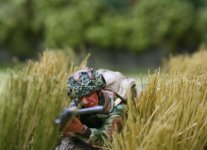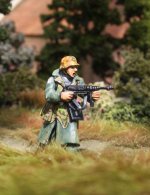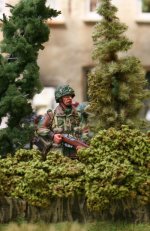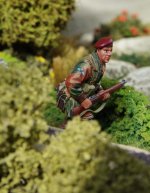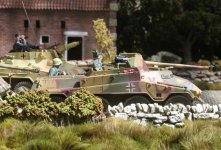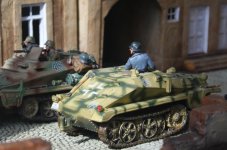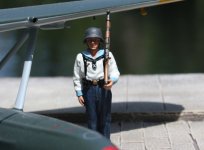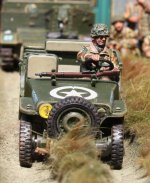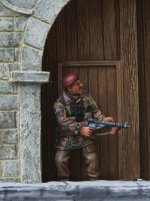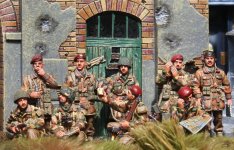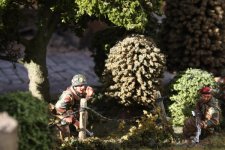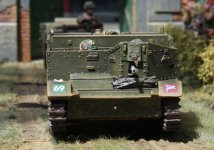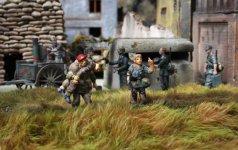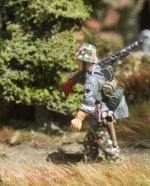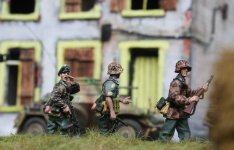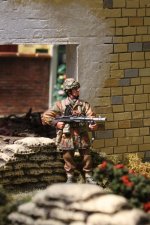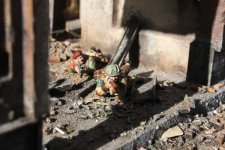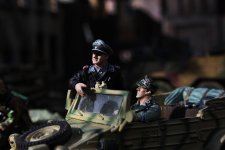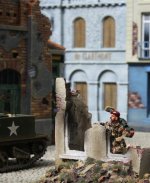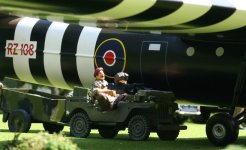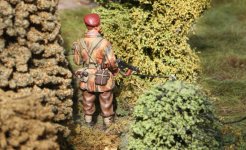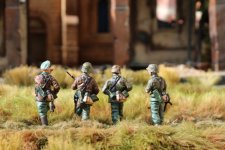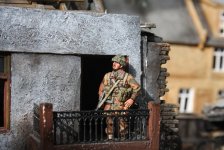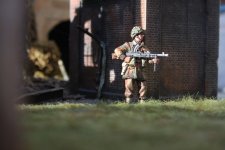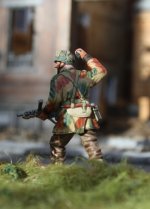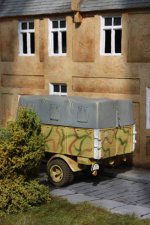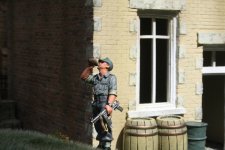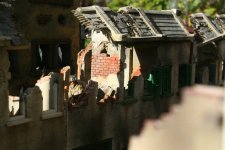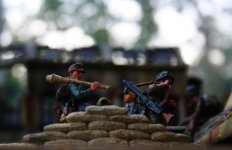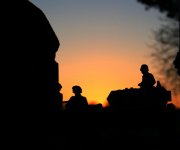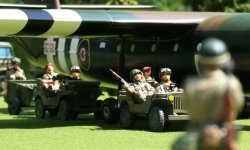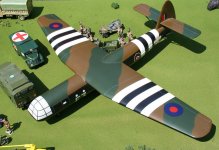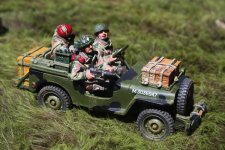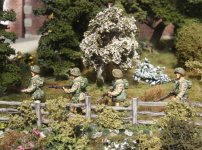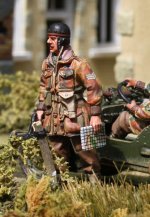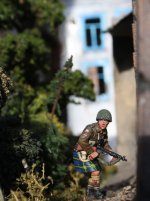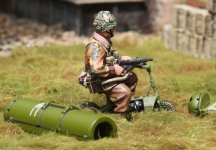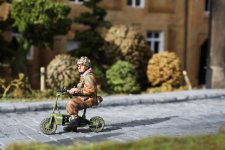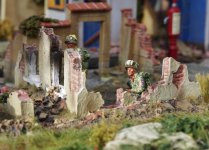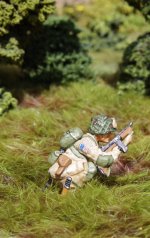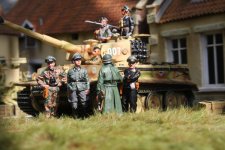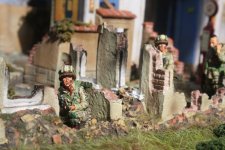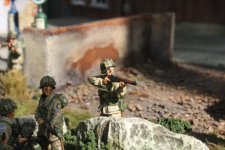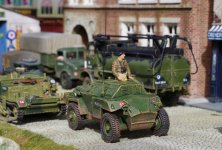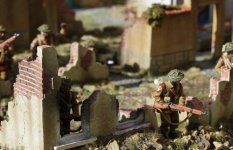panda1gen
Colonel
- Joined
- Jul 29, 2005
- Messages
- 8,182
In his book about the fight for Arnhem, M. Middlebrook quotes some veterans who fought in that confused period.
Private John Hall was a Bren gunner in Lieutenant Michael Kilmartin's No. 1 Platoon,
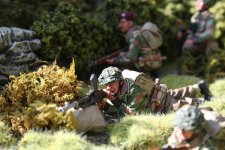
‘Our platoon commander led us through the wooded area until we came to a road. We were about to cross when suddenly machine-gun fire opened up; one man fell to the road, his body moving with the impact of the bullets.
We returned the fire and after a short while silenced the Germans and continued on our way.
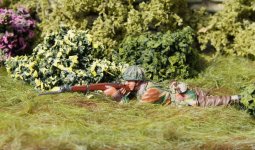
Small skirmishes occurred every so often. During one of these encounters a German soldier emerged from the trees, and one of our NCOs went to bring him in; as he did so, other Germans under cover shot him. From then on we said, 'No prisoners' (we had nowhere to put them anyway).
Our platoon commander seemed to keep us to the wooded areas as much as possible, and we made good progress. It only seemed as if a few minutes had gone by when the sound of rumbling could be heard, and we were told to dig in. Out came our entrenching tools, and we dug into the sandy soil to get our bodies below ground level but still have a good firing position.
The sound of those tanks was now quite near, and all of a sudden hell seemed to break out - shells bursting, bullets flying and trees cracking with the impact. In the flashes of gunfire we saw the silhouettes of armoured vehicles.
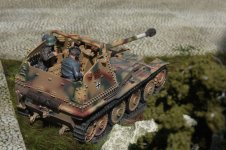
We returned the fire. This was the one time I said a prayer – and I do believe it carried me through what was to follow’.
Lieutenant George Guyon commanded the Mortar Platoon, which now sought to support the attack,
‘The wood came to an end about a hundred yards short of the enemy, and the open space beyond was obviously lethal. I had the mortar set up in a clearing, but our wireless, which had worked well up to now, packed up, and I had to string men from the OP [Observation Post] to the mortar.
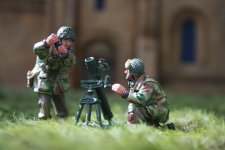
This took time, and the company had some casualties before I could get the first bomb on the ground. My fire controller could see little of the ground ahead due to its broken nature, but he very efficiently searched it with groups of rapid fire which made the enemy withdraw hurriedly, leaving a truck behind.
We left this alone, as it was getting dark by now and it might well have been booby-trapped, and we continued the advance after reorganizing. Our casualties were one dead and three or four wounded’.
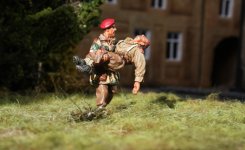
Private John Hall was a Bren gunner in Lieutenant Michael Kilmartin's No. 1 Platoon,

‘Our platoon commander led us through the wooded area until we came to a road. We were about to cross when suddenly machine-gun fire opened up; one man fell to the road, his body moving with the impact of the bullets.
We returned the fire and after a short while silenced the Germans and continued on our way.

Small skirmishes occurred every so often. During one of these encounters a German soldier emerged from the trees, and one of our NCOs went to bring him in; as he did so, other Germans under cover shot him. From then on we said, 'No prisoners' (we had nowhere to put them anyway).
Our platoon commander seemed to keep us to the wooded areas as much as possible, and we made good progress. It only seemed as if a few minutes had gone by when the sound of rumbling could be heard, and we were told to dig in. Out came our entrenching tools, and we dug into the sandy soil to get our bodies below ground level but still have a good firing position.
The sound of those tanks was now quite near, and all of a sudden hell seemed to break out - shells bursting, bullets flying and trees cracking with the impact. In the flashes of gunfire we saw the silhouettes of armoured vehicles.

We returned the fire. This was the one time I said a prayer – and I do believe it carried me through what was to follow’.
Lieutenant George Guyon commanded the Mortar Platoon, which now sought to support the attack,
‘The wood came to an end about a hundred yards short of the enemy, and the open space beyond was obviously lethal. I had the mortar set up in a clearing, but our wireless, which had worked well up to now, packed up, and I had to string men from the OP [Observation Post] to the mortar.

This took time, and the company had some casualties before I could get the first bomb on the ground. My fire controller could see little of the ground ahead due to its broken nature, but he very efficiently searched it with groups of rapid fire which made the enemy withdraw hurriedly, leaving a truck behind.
We left this alone, as it was getting dark by now and it might well have been booby-trapped, and we continued the advance after reorganizing. Our casualties were one dead and three or four wounded’.



